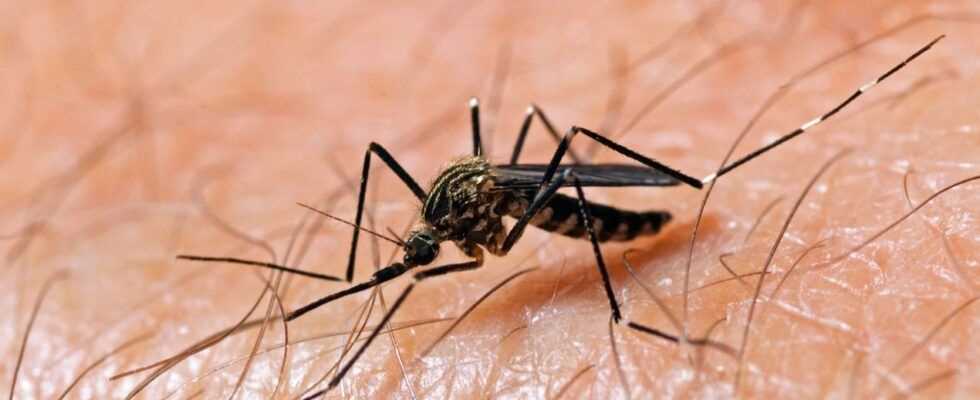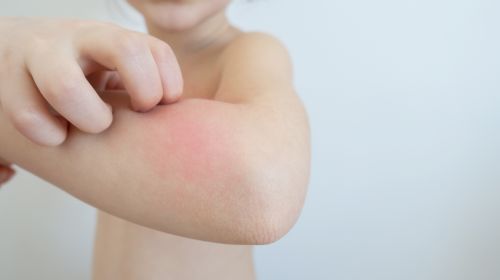The infectious disease West Nile fever is transmitted by mosquitoes. Since the West Nile virus can also overwinter in Germany, more and more cases are being observed here. The symptoms of an infection, what treatment to consider and how to protect yourself.
- West Nile fever is transmitted by mosquitoes.
- © iStock.com/doug4537
West Nile fever is an infectious viral disease that is transmitted by mosquitoes. Typical symptoms of West Nile virus infection are flu-like symptoms with fever, although most cases are symptom-free. In mid-August 2020, four cases of infected people became known in Germany.
Article content at a glance:
How do you get infected with West Nile fever?
The main route of transmission of the virus is through mosquitoes between birds, but mammals and humans can also be infected with the West Nile virus through mosquitoes. In addition, humans can become infected through organ transplants and infected blood transfusions, and transmission between mother and unborn child is also possible during pregnancy.
Warm temperatures are favorable for mosquitoes – in Germany, therefore, late summer and a warm early autumn are the main season, in southern Europe the West Nile virus is often transmitted well into winter. The virus can also hibernate on site.
In which countries the West Nile virus is more prevalent
West Nile fever occurs in different regions around the world. The virus is found in Africa, North America, parts of Central America, the Middle East, India, Israel, parts of Southeast Asia and western Turkey.
The West Nile virus also occurs in Europe and the Mediterranean region through migratory birds. In summer, infections are therefore possible in southern France, northern Italy, Greece and large parts of the Balkans, parts of the Czech Republic, Hungary, Slovakia and Austria as well as Turkey. The European Center for Disease Prevention and Control (ECDC) of the European Union provides continuously updated information on affected countries.
According to the Bernhard Nocht Institute for Tropical Medicine (BNITM), four cases of infected people in Germany with blood and plasma donations were reported in mid-August 2020. There are also other suspected cases. In 2018, the first people infected with West Nile fever in Germany were reported.
Symptoms and course of West Nile fever
In most cases, infected people do not show any noticeable symptoms. Every fifth sufferer suffers from flu-like symptoms, which usually last between three and six days. Infected people do not need to be isolated from others while they are ill.
Common symptoms of West Nile fever:
A person rarely becomes seriously ill with the neuroinvasive form, in which the central nervous system is also affected. In such cases, benign meningitis, mental changes, muscle weakness, paralysis, ataxia, movement disorders, inflammation of the optic nerve, changes in the cranial nerves, inflammation of the nerve roots, or epileptic seizures may occur.
West Nile fever infection usually heals without complications. Only those affected with encephalitis suffer more often from the long-term effects of the disease. In the neuro-invasive form of West Nile fever, five to ten percent of the sick, mostly older people and those with pre-existing cardiovascular diseases or a weakened immune system, die.
West Nile fever: diagnosis and therapy
Anyone who returns after a vacation in a risk area for West Nile fever and shows symptoms should contact their family doctor immediately. For this infectious disease there is a notification requirement, a proven infection with the West Nile virus must be reported to the health department.
At the beginning of the infection, only the virus can be detected in the blood or serum. After a few days, the body usually forms appropriate antibodies against the West Nile virus – these can then be detected in the blood or liquor (brain water).
The disease is normally self-limiting and ends by itself after around seven days. So far, there are no specific drugs that are directed against the West Nile virus, and there is no vaccination. The treatment therefore focuses on relieving existing symptoms such as fever, headache or back pain. Severe and neuroinvasive cases are usually observed and treated in the hospital.
How can you prevent infection?
A suitable vaccine against West Nile fever is not yet available. Therefore, protecting against mosquito bites with long clothing and repellants is the only way to prevent infection. This is especially true when traveling to countries and areas where the West Nile virus occurs. The mosquitoes that transmit it are also active during the day, which is why protection should be maintained throughout the day.
In recent years, the number of infections in Germany has increased, so that suitable mosquito repellants should also be considered in this country in late summer and autumn.


